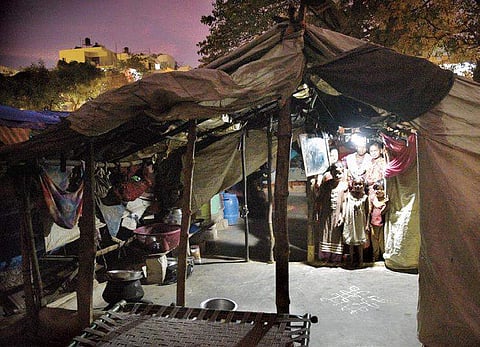

BENGALURU: Imagine having to walk 50 kilometers a day, with a decorated bull in tow, to make around Rs. 200 daily. While the city traffic and pollution would put anyone on edge, for Gangireddollus, the opportunity comes as a boon. The Gangireddollus tribe, around 300 people, most of them landowners in neighbouring Andhra Pradesh, are relegated to living in 40 thatched huts between Hoskerehalli and Rajarajeshwarinagar. Over a period of time, successive droughts killed the groundwater levels in their hometown, leaving them with no option but to head out in search of a livelihood. This journey eventually led them to the IT city of Bengaluru.
According to the tribe, the bulls they decorate are not normal animals. They have the ability to respond to questions, simply by nodding their head. These bulls are also trained to perform to the tunes of Nadaswara and Dollu, both instruments played by the tribe members. The owner of the bull takes the animal to individual houses and asks questions about the house and its residents. The bull then responds by nodding. This practise is also called Kole Basava in other parts of Karnataka.
“We would farm our fields during monsoon and would grow tur dal and sunflowers in the half acre of land that I own. During other seasons, the decorated bull would be taken to nearby areas and we would get rice and money. In the previous few years however, farming has become impossible due to the drought. Getting work as farm hands is also not possible anymore as there is no rain,” Subbanna, a member of the tribe said.
Talking about life in the city, he said, “Now we only depend on Basava (bull). Here in Bengaluru, each of us travels in different directions each day and we earn around `200 daily.” In his quest for a decent living, Subbanna and his tribe have travelled to Mysuru, Udupi and Kodagu before settling down in Bengaluru as they believed there was more money to be made here.
Ask them about their history and they proudly say that the tribe was born when river Ganges came to earth. “Since then, we are taking care of the bull/oxen and decorating it has become our lifeline,” Subbanna said. Over generations, the knowledge of playing the dollu and nadaswara has been passed on along with the art of training the bulls. “Today I am an expert in playing Seetha Rama Kalyana using a cow and an ox. It’s a family tradition we are proud of,’’ Manjanna from a village near Prakasam district said.
The husband and wife leave with their bulls to different localities everyday. “Going to the same place will not get us full meals. So we choose a different place, where people give us rice, ragi, fruits, clothes, money and many more things. Whatever the bull can have, we will give it to the bull. Remaining items we bring home. During Sankranthi, we will be invited by many organisations for the traditional ritual of jumping on fire, we will get some money at that time too,’’ Subbanna said.
Earlier, they used to get some earning from their farms. Now that it has stopped, in order to maintain day to day expenses as well as their children’s education, wedding and other expenses, these people even go in for loans at the local co-operative society or banks. “We have to pay interest of `800 to `2,000 per month. If we stay at our village, we will not get any money. By earning in Bengaluru, we pay through bank,’’ Subbamma, another member of the tribe said.
When there was good rains, she used to earn `50 per day as a farm labourer. For this she has to work from morning till evening. They need two years to pay this loan.Lakshman has brought a bull for `50,000 on loan. “I am repaying it to the lender every month. Bulls are our investment. The life span of a bull is 20 years and we need three months to train them,’’ he said. The thatched hut they stay in neither has power or water facilities. They use a solar charged lamp. Interestingly they have smart phones.
“We charge at a nearby bakery or hotel where we have to pay `5 per half an hour,’’ he said. The Nadaswara and dollu they would play was learnt from their fathers and grandfather who were into traditional carnatic music. Now, after landing in Bengaluru, they have learnt many Kannada movie songs which they play. “This we play on demand and that catches ears of people. We have to live with the times,’’ he added.